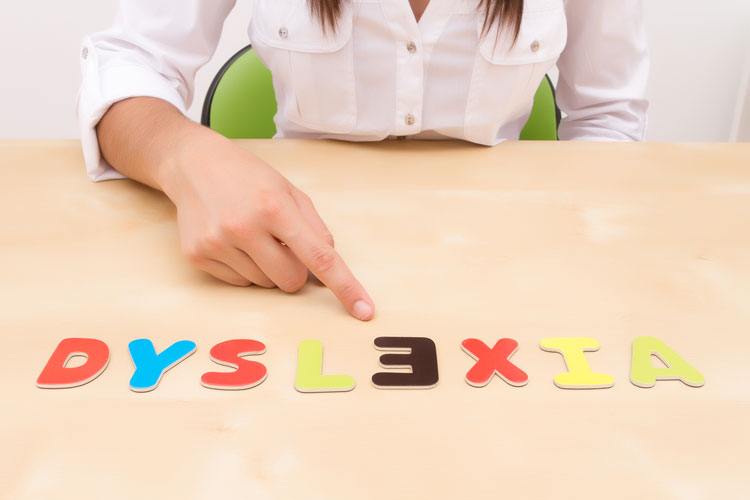Warning Signs of Dyslexia
If a child or an adult has 3 or more of these warning signs, then their reading and spelling issues may be due to dyslexia.
In Preschool
- delayed speech
- mixing up the sounds and syllables in long words
- chronic ear infections
- stuttering
- constant confusion of left versus right
- late establishing a dominant hand
- difficulty learning to tie shoes
- trouble memorizing their address, phone number, or the alphabet
- can’t create words that rhyme
- a close relative with dyslexia
In Elementary School
- dysgraphia (slow, non-automatic handwriting that is difficult to read)
- letter or number reversals continuing past the end of first grade
- extreme difficulty learning cursive
- slow, choppy, inaccurate reading:
- guesses based on shape or context
- skips or misreads prepositions (at, to, of)
- ignores suffixes
- can’t sound out unknown words
- terrible spelling
- often can’t remember sight words (they, were, does) or homonyms (their, they’re, and there)
- difficulty telling time with a clock with hands
- trouble with math
- memorizing multiplication tables
- memorizing a sequence of steps
- directionality
- when speaking, difficulty finding the correct word
- lots of “whatyamacallits” and “thingies”
- common sayings come out slightly twisted
- extremely messy bedroom, backpack, and desk
- dreads going to school
- complains of stomach aches or headaches
- may have nightmares about school
In High School
All of the elementary symptoms plus:
- limited vocabulary
- extremely poor written expression
- large discrepancy between verbal skills and written compositions
- unable to master a foreign language
- difficulty reading printed music
- poor grades in many classes
- may drop out of high school
In Adults
Education history similar to elementary and high school, plus:
- slow reader
- may have to read a page 2 or 3 times to understand it
- terrible speller
- difficulty putting thoughts onto paper
- dreads writing memos or letters
- still has difficulty with right versus left
- often gets lost, even in a familiar city
- sometimes confuses b and d, especially when tired or sick
Since 40% of children and adults with dyslexia also have ADHD, please review the following signs.
Physical Activity
Either:
- Can’t sit still
- Feels restless
- Has boundless energy
- Always fidgeting, restless feet, etc.
Or:
- Couch potato
- Lethargic, slow, space cadet
- Physically there, mentally gone
Frequent Mood Swings
- Feels emotions intensely
- Higher highs and lower lows
- Low tolerance for frustration
- May have rage attacks
Attention
- Trouble deciding what to pay attention to
- What’s most important
- Trouble getting started on a task
- Often feels overwhelmed
- Trouble staying focused on repetitive tasks
- Until the task is complete
- Can’t do homework independently
- Trouble shifting attention
- To a new task
Highly Distractable
- Distracted by any change in environment
- Any noise, movement, or smell
- Also distracted by their own thoughts
- Daydreamer
- Can’t stay focused for long
- Except Nintendo-type games or TV
- Or a new or scary activity
- May hyperfocus on a hobby
- Starts many projects
- But rarely finishes them
Impulsive
- Can’t wait to be called on
- Blurts out answers in class
- Extremely impatient
- Difficult to wait for his/her turn
- Often acts before thinking
- Doesn’t seem to learn from mistakes
Doesn’t Listen Well
- Confused by multi-step oral directions
No tolerance for boredom
- May start arguments if things are too calm
Time Management
- Always rushing; can’t slow down
- Makes careless mistakes
- Hates to doublecheck
- Doesn’t use class time well
- Feels rushed by teachers & parents
- Puts most things off until the last minute
Odd Sleep Cycles
- Night owl, hates to go to bed
- Difficult to wake up in the morning
- May be a restless sleeper
- Bedwetting or sleepwalking
Inconsistent Performance
- Good days and bad days
- Some days they can do the schoolwork, other days they can’t.
Disorganized
- Messy room, desk, backpack
- Constantly loses or misplaces things
Other Symptoms
- Chatterbox; talks excessively
- Interrupts conversations frequently
- Strong sense of justice; bossy
- Lots of allergies
- Terrible penmanship
- Trouble remembering daily routines
- Relatives with ADHD




